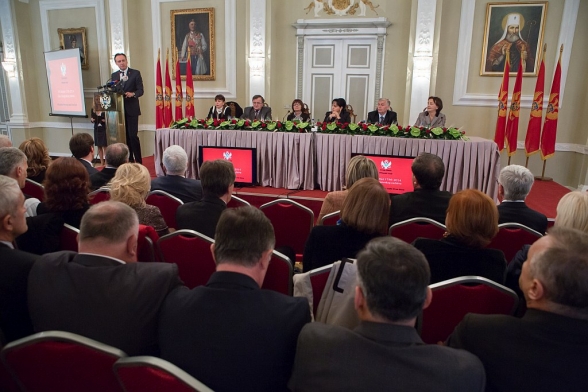SPEECH BY PRESIDENT MR RANKO KRIVOKAPIĆ
Montenegrin Judiciary Day – 29 October 2014
Government House, Old Royal Capital Cetinje
Esteemed President of the Supreme Court,
Esteemed members of the Government,
President of the Constitutional Court,
Your Excellences,
Especially dear guests from the region,
Representatives of the judicial power from the region,
It is my great pleasure to greet you on behalf of the Parliament of Montenegro, on a day when the justice is celebrated, a foundation of every state, and in Montenegro the foundation of its nation. The small country could only survive on justice, solidarity and belief in justice. Even when there was no justice for Montenegro, she believed in justice. Therefore, this hall where we are looked at by seven Petrović, and by previous four Montenegrin dynasties, is an opportunity to – on this day – day which represents the core stone of Montenegrin judiciary, we measure ourselves before them, and not less important, stand in front of the existing challenges. In Montenegro they are most frequently referred to as Euro Atlantic challenges.
But, those are our challenges. We need justice not for Europe or NATO integration. We need justice for our dignity, for our honour, for our religion, and for our duration. Therefore, we will integrate in order to be ourselves, not to be somebody else. Because we knew what was justice in times when there was no justice for us and when there was no justice in Europe. We knew what the justice was on 13 July, in the period when people in Europe did not raise sufficiently to fight against fascism. We knew what justice was also in all other circumstances. So, the challenges are big.
Our ancestors created a lot fighting for the justice. We have to create a lot in order to be just and equal. Heritage is in front of us. General Montenegrin and Mountain Code and Danilo's Code which has constitutional elements - elements of constitutional acts, and certainty all seven constitutions adopted by Montenegro. Since 1905 until today we have had seven constitutions, two in independent and five in not less happy countries. And the constitutional system of Montenegro has been constructed, I dare say, to be today in many ways more advanced than those in Europe, which are traditional and which are stable. Of course, it is also a risk.
When you make a step forward, as we have done, in the organisation of judicial power, there is a lot of unknown, there is a lot of paths that no one walked through, but we tried with our constitutional system to give full guarantees to the independence of Montenegrin judiciary. There is no absolute independence as there is no absolute freedom. It is always restrained by something, and the only thing that may restrain Montenegrin judiciary is accountability for its results and its decisions, and that is not the only restriction which is in front you now. That restriction is not small. Whoever gets power, and there is no greater power than sharing justice among humans, because it is almost close to divine power, he/she must have a responsibility to share that justice. For justice decides on human life, it decides on freedom - the greatest treasure of each of us.
With that awareness, esteemed colleagues, I dare say that you open a new room for Montenegro. It is rare, also in other countries, that judiciary in one historic moment has such significance for a state. This is that moment for Montenegro. Words “progress report” have become famous in Montenegro, but it is the very moment when that step forward is expected from the judiciary, that higher quality which will certainly open the door of the NATO pact and we will continue to advance constantly in European integration. France had such task. In several of its republic, there was an affair “Dreyfus”. It was able to build on that case the strength of its judiciary, its intelligence and its media, and it has managed to do so.
That's why I see this year ahead of us as a chance for Montenegro to step forward, believing in Montenegrin judiciary, and with that power, it will be able to enhance and prove that evaluations are transient, and that the strength of the Montenegrin justice is eternal. The main religion in Montenegro will be the faith in its justice. If Montenegrin citizens believe in justice, they will also believe in the state of Montenegro, its stability and reliability for a safe and peaceful life. You know better than all of us, better than us who adopt laws, that state’s fundamental power lies in its ability to enforce laws. It is not difficult to propose a law, it is not difficult to pass a law, but it is difficult to apply it meaningfully and essentially. It is a challenge for all of us. Only together, we can make such way of life, behaviour and belief to be permanent in Montenegro, and that is the only way for us to get a full respect of our Euro-Atlantic partners.
If we did not believe, we would not be here. If we did not believe, we would not be lawyers. I will be free before you, my colleagues, to share that thought of a semi-literate man who said to me, at the beginning of my studies that I studied what did not exist – the law. This evil threat follow us all, and that is a commitment of all of us in our lives. We constantly prove that there is a law, that there is a justice, and that we believe in the ideal of justice. Justice will never be a full part of our life, but legality must be a full part of our lives.
With faith in Montenegrin judiciary, the state of Montenegro, in our Euro-Atlantic future, I congratulate you once again your holiday, and wish you much success. Thank you.









